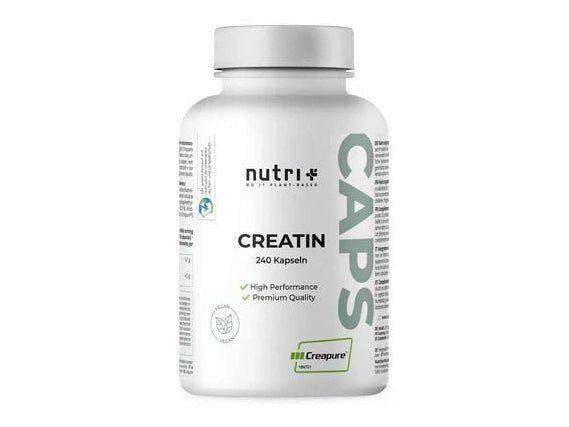
Benefits and uses of creatine
Share
The use of creatine in sports
Creatine is one of the most researched and effective supplements used to improve performance. Its effects are based on increasing muscle phosphocreatine stores, which allows for more efficient energy production during short-duration, high-intensity exercise.
Benefits of Creatine for Athletes
Creatine supplementation has been shown to be particularly beneficial in strength training, explosive power-demanding activities, and repetitive high-intensity sports. Kreider et al. (2017) emphasize that creatine:
- Increase maximum strength and performance
- Improves muscle mass growth when combined with exercise
- Speeds up recovery after intense workouts
Burke & Deakin (2015) add that creatine may also benefit athletes who compete in multiple events during the same day, such as ball sports and martial arts.
Creatine Use and Safety
Creatine is widely considered a safe dietary supplement when used as recommended (3–5 g/day). Kreider et al. (2017) show that long-term use does not cause significant adverse effects in healthy individuals. Furthermore, creatine does not impair kidney or liver function, even when used at high doses for short periods.
Jeukendrup & Gleeson (2019) note that creatine monohydrate is the most effective and economical form of supplement. Other forms of creatine, such as creatine ethyl ester or buffered creatine, have not been shown to be significantly better in their effects.
Special considerations for vegans and women
Vegans and vegetarians are particularly likely to benefit from creatine supplementation, as their diets contain less creatine, resulting in lower muscle and brain creatine stores. Burke & Deakin (2015) and Jeukendrup & Gleeson (2019) highlight that creatine supplementation can improve both physical performance and cognitive function in these groups.
In women, creatine supplementation can support the development of strength and muscle mass without significant weight gain, which is mainly due to muscle hydration.
Endurance training and creatine supplementation – benefits and challenges
The effects of creatine supplementation on performance in endurance athletes have been the subject of much debate and the research evidence is mixed. One significant factor that may impact the usefulness of creatine supplementation is its fluid retention, which can lead to a 1-2 kg weight gain. This can be a disadvantage, especially in "weight-sensitive" sports such as running or other sports that favor a light body weight.
On the other hand, the potential benefits of creatine supplementation in endurance sports have been highlighted and may provide advantages in certain situations:
-
More efficient sprints in endurance sports
Many endurance sports, such as road cycling or team sports, require the ability to perform fast and powerful bursts as part of their performance. One study found that creatine supplementation improved sprint performance in cyclists after a long aerobic workout. This suggests that creatine supplementation could help improve anaerobic performance during endurance sports. -
Replenishment of glycogen stores
Creatine supplementation can enhance the formation of glycogen stores in the muscles, which is especially important in sports where energy stores are depleted during long runs. For example, marathon runners and ultrarunners can benefit from this when energy is desperately needed towards the end of the run. -
Better thermal regulation in warm conditions
Creatine supplementation increases intracellular fluid levels, which can improve the body's thermoregulation. This can be a significant advantage when competing or training in hot climates, as good thermoregulation helps maintain performance and prevents heat exhaustion.
Who is creatine supplementation suitable for?
While creatine supplementation may have potential benefits, its suitability depends on the sport and the athlete's goals. Weight gain can be problematic for endurance runners, for example, but beneficial for cyclists or sprinters who need more explosive power without a significant impact on body weight. If you are not an athlete and weight gain is not such a significant issue, you can also try creatine supplementation for endurance sports.
It is important to experiment with creatine supplementation during the training season so that potential effects on performance and body weight can be safely assessed before competition. Additionally, athletes should always discuss the use of supplements with a knowledgeable coach or nutritionist.
Conclusions
Creatine is a safe and effective dietary supplement that offers significant performance-enhancing benefits for both athletes and active people. Research evidence supports its use in a wide range of sports, and it is also suitable for special groups, such as vegans.
Get quality creatine supplements from FuturePeaks
If you're considering taking a creatine supplement, check out the wide range of vegan creatines available at FuturePeaks. All products are selected to support performance and well-being, and are suitable for both athletes and active people.
Check out the selection : futurepeaks.fi/creatines